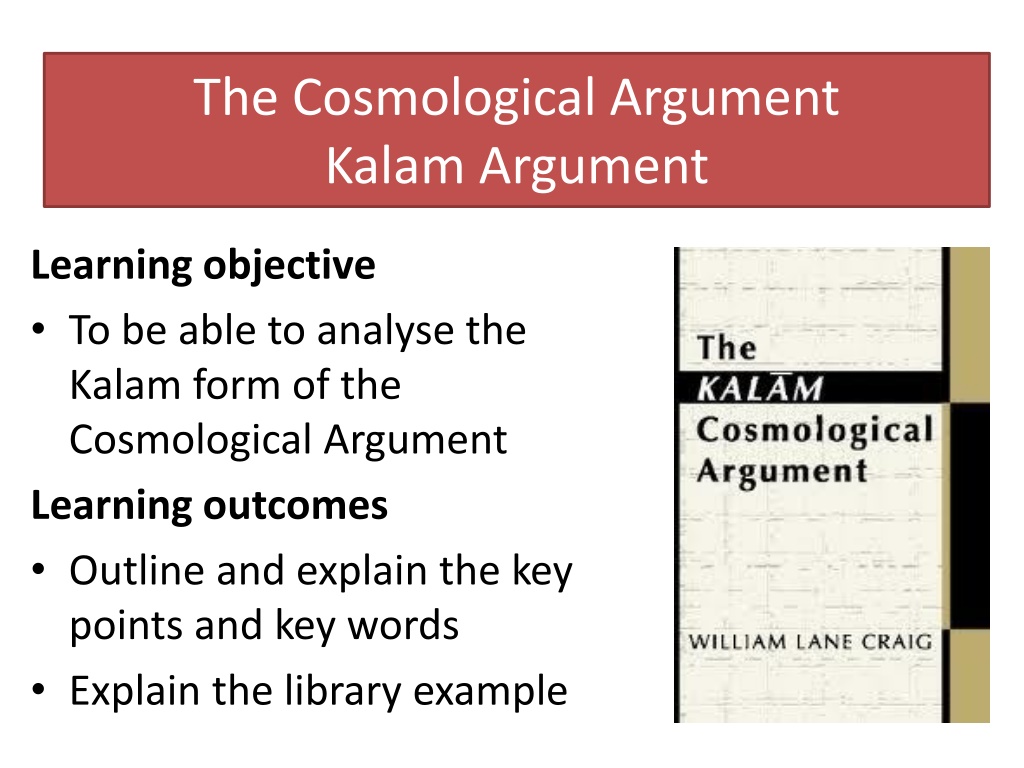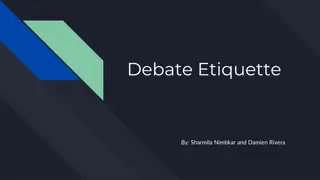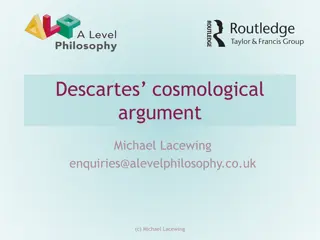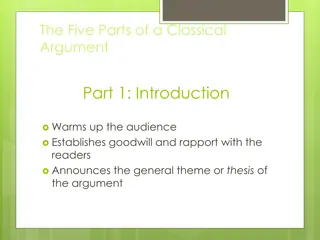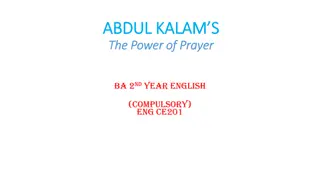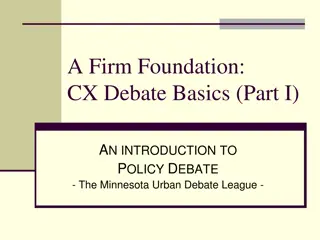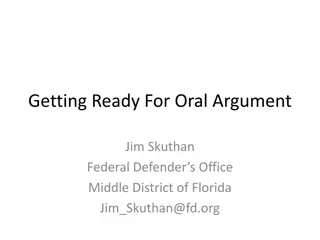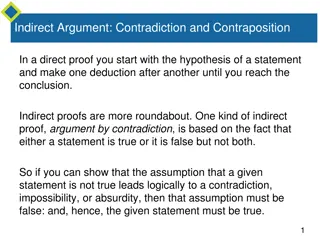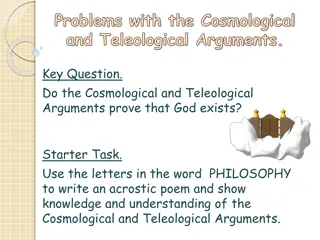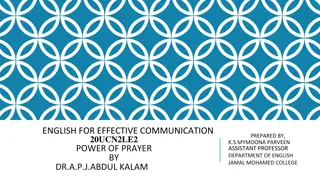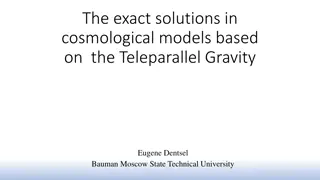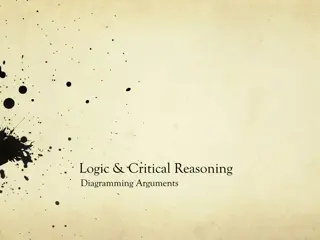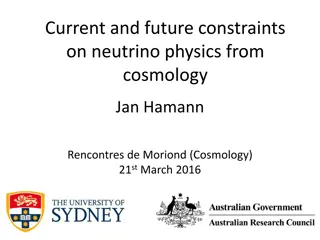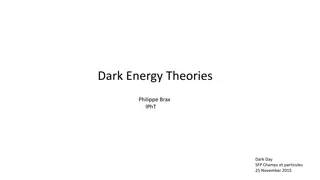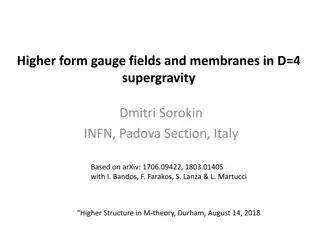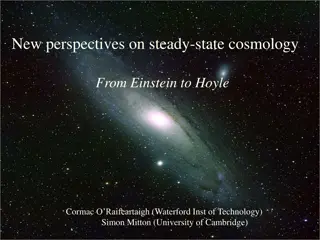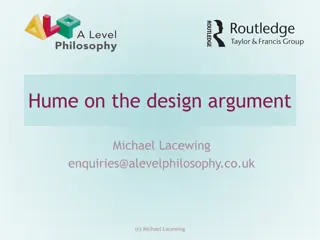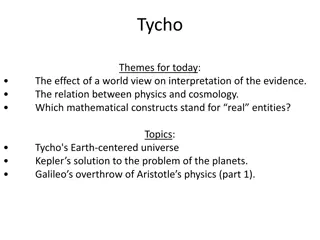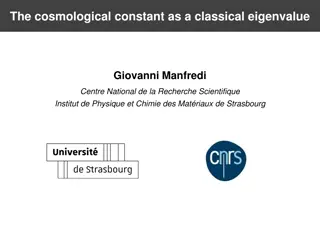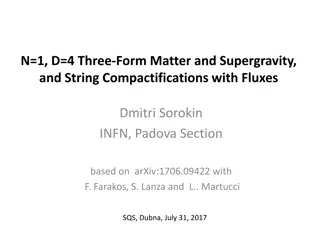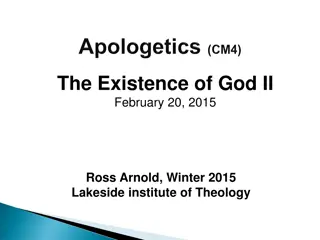Understanding the Kalam Argument in the Cosmological Debate
The Kalam Argument, a form of the Cosmological Argument, asserts that everything with existence has a cause, including the universe. Developed by thinkers like al-Kindi, al-Ghazali, and William Lane Craig, it aims to prove that God was the initial cause of the universe. This argument suggests that the universe's finite nature implies a beginning and a creator. The example of an infinite library of books is used to illustrate the concept.
Download Presentation

Please find below an Image/Link to download the presentation.
The content on the website is provided AS IS for your information and personal use only. It may not be sold, licensed, or shared on other websites without obtaining consent from the author. Download presentation by click this link. If you encounter any issues during the download, it is possible that the publisher has removed the file from their server.
E N D
Presentation Transcript
The Cosmological Argument Kalam Argument Learning objective To be able to analyse the Kalam form of the Cosmological Argument Learning outcomes Outline and explain the key points and key words Explain the library example
Starter The Cosmological Argument so far . . . You have 30 seconds Write down as many words connected to the Cosmological Argument you can remember Swop your lists count how many relevant words they found Write brief definitions of the key words you know and then swop the lists again. Complete the Venn Diagram on page 2
Kalam in booklet 2 An Arabic term meaning to argue or discuss Argues that everything that exists has a cause of its existence and this includes the universe William Lane Craig developed a modern version of the argument
History of the Kalam Argument page 3 850CE al Kindi and al Ghazali - Islamic thinkers who were influenced by Aristotle and developed the argument to explain God s creation of the universe. 20thCentury William Lane Craig American Christian The Kalam argument is cosmological because it seeks to prove that God was the first cause of the universe.
Summary of the Kalam Argument page 3 Whatever comes into being must have a cause The universe came into being The universe must have a cause If the universe has a cause of its existence it must be God God exists Supporters of this theory believe God created the universe ex nihilo It is an axiom of reason that all that comes to be must have a cause that brings it about. The world has come to be. Ergo the world must have a cause to bring it about al Ghazali
Kalam- argues that God is the creator of the universe. The universe must be finite A finite universe had a beginning Whatever begins to exist has a cause Therefore the cause must be God
William Lane Craigs example used to support the Kalam Argument Eg, imagine an infinite set of books in a library A part of an infinite set is equal to the whole of the infinite set, because both the part and the whole are infinite. A count of all the even numbered books is the same as a count of all the books This does not make sense so the universe can not be infinite
Activities Read pages 3, 4 and 5 Complete tasks 1 and 2 Whatever begins to exist, has a cause of its existence The universe began to exist Therefore the universe has a cause of its existence Explanation Actual infinite can t exist Argument 1 Library Argument 2 Actual infinite can t be formed Actual infinite can t be formed Write down today's date Write down the year you were born You can count the number of years that have passed since you were born because you have a starting point!
Craig concluded that: The history of the universe was formed by one event following on after another event this is successive addition (birthday example) A collection formed by successive addition cannot be actually infinite Therefore, the universe must have had a beginning in time The argument aims to prove God as the personal creator of the universe. As the laws of nature cannot have existed before the beginning of the universe, the universe cannot be the result of natural causes, Craig claimed - if the universe began to exist, and if the universe is caused, then the cause of the universe must be a personal being who freely chooses to create the world. Task 3 Reread page 5 and complete page 6 Why does Craig argue there must be a personal creator/agent? Add the
Can you remember what these words mean? 1. Valid 2. A posteriori 3. Sound 4. Inductive 5. A priori 6. Deductive 1. From or after experience or evidence 2. The logic is correct and the premises are true 3. No mistakes in logic 4. If the premises are true the conclusion could still be false 5. If the premises are true the conclusion is true 6. Truth value determined before/without evidence
Kalam knowledge test 1. Kalam 2. Actual Infinity 3. Possible infinity 4. Ex Nihilo a. Derived from the Latin meaning out of nothing b. An Arabic term which means to speak, argue or discuss c. It refers to sets or collections of things with an infinite number of members. A part within an actually infinite set is equal to the whole set because it is infinite. d. Exists if it always possible to add one more to a series of things or events.
Summary 1. Inductive and a posteriori 2. William Lane Craig s premises Whatever comes into being must have a cause The universe came into being The universe must have a cause If the universe has a cause of its existence it must be God God exists - Supporters of this theory believe God created the universe ex nihilo 3. Rejection of an actual infinite - The library example 4. Actual infinite can t be formed - Successive additions 5. The personal creator frozen water
Consolidating WLC programme Make a note of any additional information http://www.youtube.com/watch?v=6CulBu MCLg0 Evaluating the argument
Just a MinuteTimer Number ones will volunteer to start to speak about the Kalam Cosmological Argument. At the first repetition, pause or mistake another takes over - and so on until the minute is up.
Challenges to the cosmological argument Can you think of any challenges to the cosmological argument?
Homework - Watch these video clips https://www.youtube.com/watch?v=MHsANALeHz8 http://www.youtube.com/watch?v=6CulBuMCLg0 AO1 essay planning 20 marks Explain the Kalam cosmological argument Explain the cosmological argument with reference to Aquinas and William Lane Craig Inductive A posteriori Aquinas and influences First way Second way Third way Kalam William Lane Craig premises Rejection of actual infinities Concept of a personal creator Inductive A posteriori Kalam - origins and meaning William Lane Craig Premises and conclusion Rejection of actual infinities Concept of a personal creator
The Cosmological Argument Kalam Argument Learning objective To be able to analyse the Kalam form of the Cosmological Argument Learning outcomes Outline the key points and key words Explain the library example
